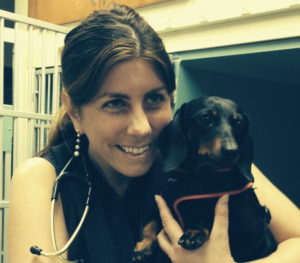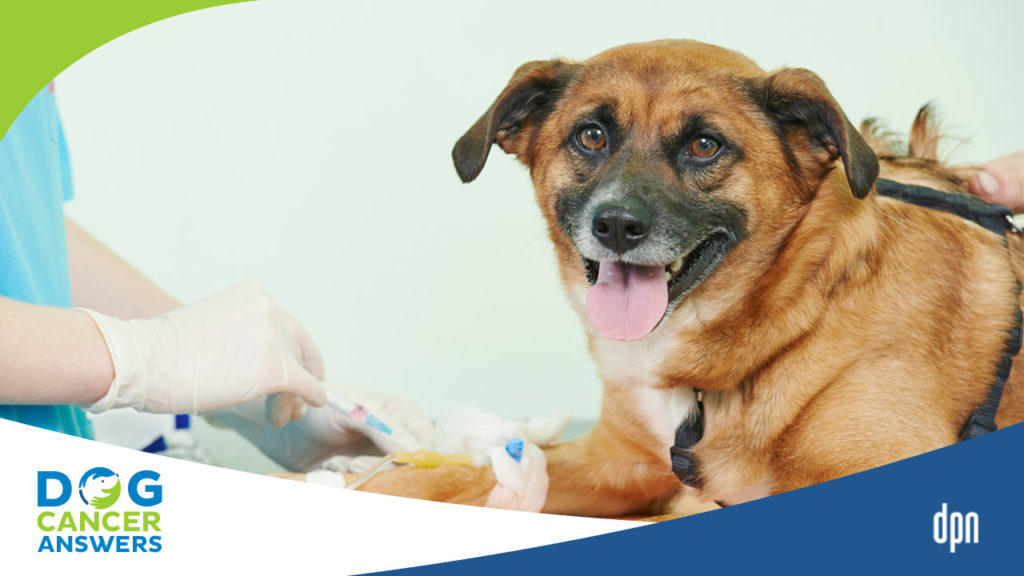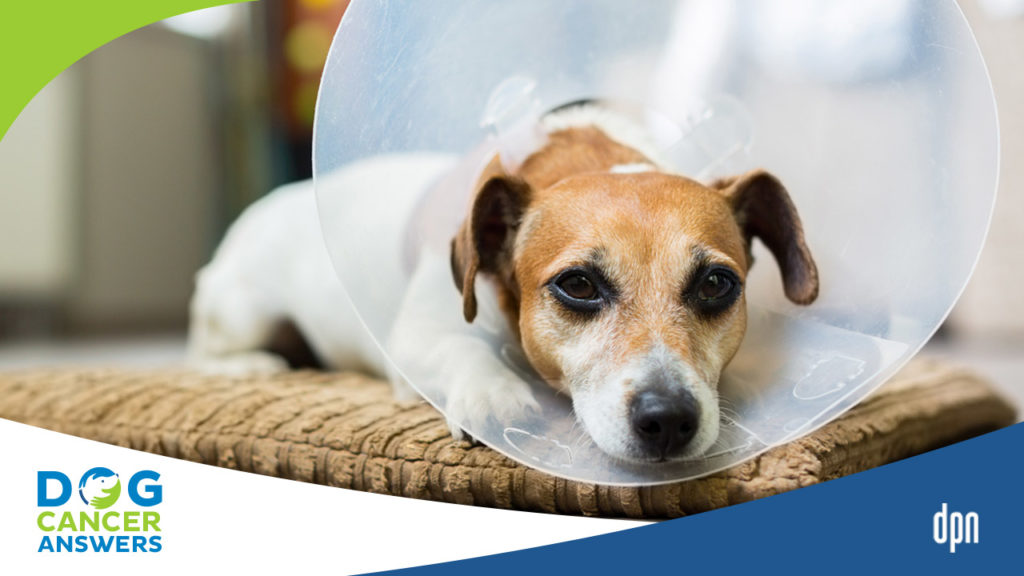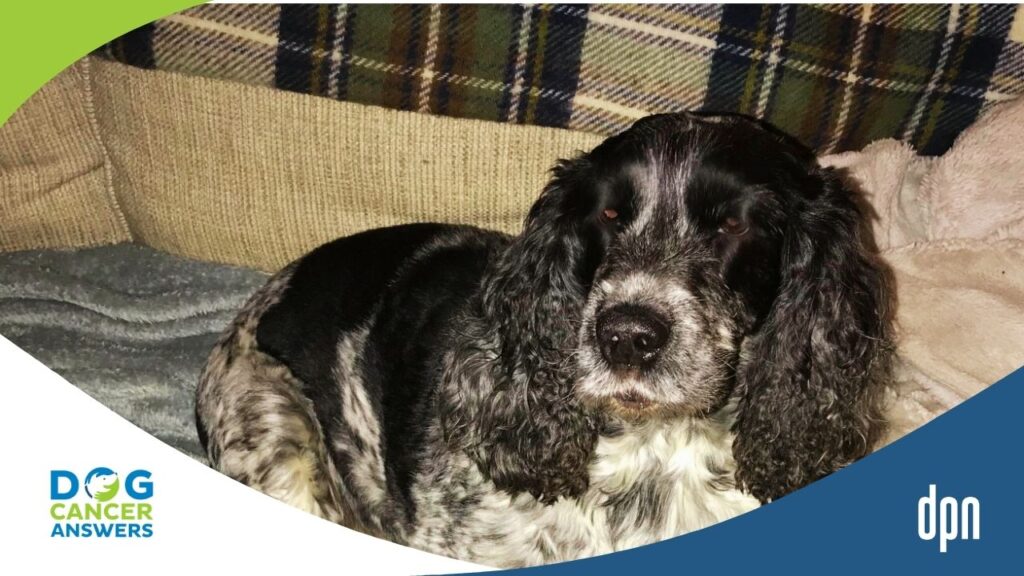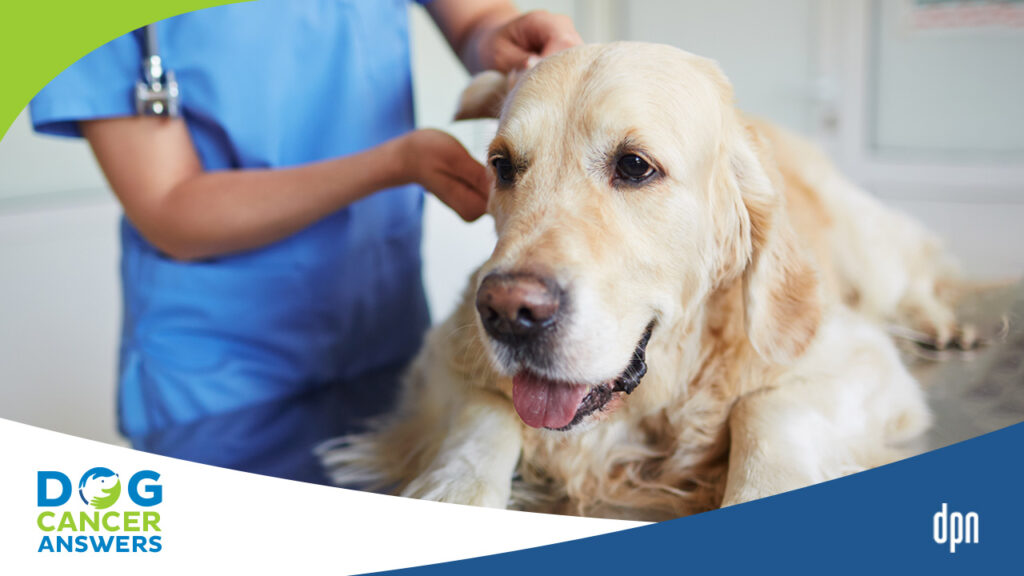EPISODE 177 | RELEASED July 25, 2022
Is a Week Too Long for Dog Breast Cancer Surgery? | Dr. Brooke Britton
A dog with mammary cancer has three problems: her tumor is very large, she has started chewing at the tumor, and her surgery isn’t for another week.
SHOW NOTES
Gio called in to our Listener Line about his dog with a mammary mass. Unfortunately, his dog has started to chew on the mass, causing bleeding and more discomfort. To make matters worse, his vet is concerned that it may be too large to completely remove with surgery.
Oncologist Brooke Britton weighs in on the different surgery options for a dog with a large mass, as well as how to protect tumors that are bleeding or that bother your dog. And when it comes to actually getting a surgery done, you might be able to schedule it with your regular vet or you might be better off scheduling with a board-certified specialty surgeon who is experienced with complicated cases.
Listen in to learn more.
Related Links:
[00:00:00] >> Dr. Brooke Britton: Some of these tumors, if they’re deeply invasive into the muscle or even the body wall, might require reconstructive surgery and not everyone, understandably, is comfortable with doing that or has enough experience to know if that’s necessary or not.
[00:00:19] >> Announcer: Welcome to Dog Cancer Answers, where we help you help your dog with cancer.
[00:00:26] >> Molly Jacobson: Hello friend. Today on Dog Cancer Answers, we’re taking a Listener Line call. Gio called us at (808) 868-3200 and left a recording of a question he has about his dog with mammary cancer. And he’s a little worried about having to wait to get that mammary tumor removed. To see if he is right to be worried and to get some more advice we’re turning to Dr. Brooke Britton, oncologist.
Dr. Britton, thanks so much for joining today.
[00:00:58] >> Dr. Brooke Britton: Thank you for having me.
[00:00:59] >> Molly Jacobson: We have a call from Gio in Pomona, California. So let’s go ahead and listen to that.
[00:01:05] >> Gio: Hi, my name is Gio. I’m calling from Pomona, California. Calling in because, uh, my dog was diagnosed with a mammary tumor. We took her in for x-rays. It hasn’t metastasized. It’s pretty large. Um, and we took her into the emergency hospital because she had gotten to it. She was biting at it and then it ruptured. She started bleeding. They recommended that, that it wouldn’t be able to get operated on because it’s too large. And I’m not sure if we should take her in to get it removed as soon as possible.
It is bandaged. It’s looking a lot better. It’s not bleeding, but, uh, I’m not sure really what to do at this point. Uh, we did change her diet to more of a keto diet. She was already kind of eating fresh food, but we eliminated all the, all carbs from her diet. And, um, yeah, we’re just not too sure what we should do.
We have an appointment on the 24th to get surgery, uh, but we’re not sure if that’s too late, about a week until her appointment. Thank you.
[00:02:09] >> Molly Jacobson: So, Dr. Britton, what do you think? Is a week too long to wait for what sounds like a, a large bloody mammary mass?
[00:02:19] >> Dr. Brooke Britton: Ideally, that would be addressed as soon as possible, but it depends on the wait times, unfortunately, for getting in to see – I don’t know if Gio is seeing his primary vet or a specialist surgeon.
But, even with general practitioners, the wait times can be up to a week or longer, sometimes much longer, because of the caseload that we’re all seeing nowadays. So as soon as possible is ideal, but as long as the tumor looks better, as he said, and relatively stable, a week could be a reasonable timeframe to have this tumor seen.
[00:02:53] >> Molly Jacobson: Okay.
What do you make of the idea that a mammary tumor is too large to remove.
[00:02:58] >> Dr. Brooke Britton: It’s hard to say, because I’m not seeing this dog myself.
[00:03:02] >> Molly Jacobson: Right.
[00:03:02] >> Dr. Brooke Britton: I’m also not a surgeon, so I’ll preface my answer by saying this. But many tumors that may not be obviously apparently resectable at first glance, sometimes with the advent of advanced imaging or with consult with a specialist surgeon who does oncologic surgeries all the time, you may get a difference of opinion as to what is resectable or removable and what is too large to be resected. There are some tumors that are clearly just too large to be removed in their entirety, in which case, occasionally we can do what’s called a debulking procedure, which is try to take off the bulk of the tumor and at least get it down to a microscopic level of disease. We know we’re not going to get a margin on the tumor, meaning a true, complete removal, but if the bulk of the tumor can be removed such that this dog can be relatively pain free after the surgery and not be in a position where she’s gonna continually bite at the tumor and have the tumor open and bleed, that would be the next best ideal.
If we can’t get a wide margin then maybe a narrow margin, at least getting the bulk of the tumor off. If the tumor is truly too big to be surgically manipulated at all, that would be more of a concern for this dog because tumor tissue, once it starts to ulcerate and bleed, it’s very difficult to prevent that from happening or stop the bleeding once that happens.
And so occasionally we can use other types of treatments, try to shrink the tumor with chemotherapy or sometimes radiation therapy, although the benefit of mammary tumors is* *not as well established for radiation. The best option here for this dog would likely be surgery, if it’s possible, to at least remove the bulk of the tumor.
[00:04:56] >> Molly Jacobson: Okay.
So it’s possible that what they were saying, that it was too large, it maybe it’s, they don’t think they can get a wide enough margin. It’s taken up so much space or it’s attached itself to other parts of the body that might be important to keep intact, like the muscle wall or something that they feel it’s too hard to remove the whole thing. Too extensive.
[00:05:14] >> Dr. Brooke Britton: Too extensive. Some of these tumors, if they’re deeply invasive into the muscle or even the body wall might require reconstructive surgery and not everyone understandably is comfortable with doing that or has enough experience to know if that’s necessary or not. And so again, it’s difficult for me to say truly is this a resectable tumor or not without seeing a tumor myself, but the best judge of that is the person who’s actually going to do the surgery.
And then it’s down to their level of experience and whether or not they specifically do oncologic surgeries routinely to know what they think is, is feasible. But the sooner the better to evaluate, because if it’s, in particular, if it’s growing quickly, that would rapidly limit the surgical options, the bigger the tumor gets.
[00:06:04] >> Molly Jacobson: Yeah. And there is a limit to people’s skills. Some veterinarians might simply not be comfortable, if there’s an oath of first do no harm, if they feel like their surgical skills are not up to the task, they might be worried that they’re actually gonna do more harm than good.
[00:06:21] >> Dr. Brooke Britton: Absolutely.
[00:06:22] >> Molly Jacobson: And so they would want someone else to take that on or to evaluate it.
[00:06:25] >> Dr. Brooke Britton: Absolutely. The level of surgical training varies a little bit, depending upon the school that you go to or whether or not you’ve done an internship, for example, and had additional training. But even with an internship, you’re really not getting a huge amount of surgical experience in most schools or internships where you’re doing a wide variety of surgeries on your own.
So many general practitioners when they’re in, out in practice, if they have an excellent mentor, or a group of mentors, they may take an interest in surgery, take additional surgical courses. And there are many excellent GP, general surgeons who feel very comfortable with a variety of different procedures. And others don’t feel as comfortable.
So there is a wide range there. With a specialist surgeon, you can be assured that they’ve at least completed a minimum case log of certain types of procedures to achieve their credentials for their board certification. And in addition, rather, you can do surgical oncology fellowships now. So beyond a traditional surgical residency, you can do oncology specific surgical fellowships.
So there is even that level of training now in our veterinary world where you have heightened levels of experience with doing increasingly more difficult and complex oncology surgeries. So there’s a lot of different surgical options out there, and a lot of levels of experience in that regard.
[00:07:49] >> Molly Jacobson: Right. And your general practitioner vet, who you’ve always gone to for everything else, you might run into this where they’re confronted with something they can’t personally handle and so we just have to wait until someone else comes along and it’s, always, that’s stressful to wait, even a week.
[00:08:04] >> Dr. Brooke Britton: Waiting is very stressful. It’s very stressful. But the good general practitioner, and there, there are many excellent GPs out there, will know – just like I would as an oncology specialist, or another specialist, an ophthalmologist for example – know the limits of our abilities with respect to what we feel comfortable with doing and the level of medicine that we can offer in our wheelhouse.
Just as, you know, if you went for a general annual physical with your MD physician and you needed, you know, a knee repair, you wouldn’t go to your general internist for a knee repair. And so it’s the same in veterinary medicine. It doesn’t mean that there aren’t excellent GPs out there that, that can do surgery, there are many GPs that do a wide variety of surgery and we’re I think a little broader in that regard than MDs, and to the better. But there are some surgeries that I would put forward it is better to at least consult with a veterinary surgeon, especially for larger or more extensive tumors where we know there’s cancer or potential of cancer, at least to get their opinion before we try a big surgery like that.
[00:09:11] >> Molly Jacobson: Absolutely.
Let’s take a quick break here. And then when we come back, I wanna talk to you about how to manage those bleeding tumors.
We are back with oncologist Brooke Britton. So he mentioned that she’s biting at it, which tells me that it’s probably uncomfortable in some way, it’s itching or it’s hurting. She’s trying to take care of it herself. Sounds like they got that under control. What do you suggest if people have a dog who’s biting at their tumor, what is it that you suggest while they wait for that surgery to come through?
How do they address that?
[00:09:49] >> Dr. Brooke Britton: It’s hard sometimes, especially when they’re losing a lot of blood or they’re having tumors that ooze constantly. But depending upon where the tumor is, sometimes they can put – it’s a little difficult in warmer weather, but they can put a little cotton onesie over the area of the tumor, like a t-shirt or uh little leg warmers, if it’s on a leg.
Something that’s breathable and not constricting. In general, we don’t like to, you know, cover tumors all the time, or open wounds, as this would be, if we can do, because a lot of the wraps, for example, that we can put on them can slip or have friction or be compressive. But sometimes when needs must, you do have to bandage or at least put a light covering over that tumor.
And then occasionally we can use medication. Gabapentin or other types of medications can help because it may be that it’s uncomfortable or a little painful, and that’s why we’re licking or chewing at it. And maybe just taking the level of discomfort down and alleviating that pain can cause them to take their mind off of it enough.
When needs must, an E-collar, especially our like soft E-collars are kind of a better quality of life issue, I think, um, in the meantime. Like a little soft flower E-collar or in, kind of an inner tube, you know, life preserver style, blow up E-collar so that they’re more comfortable, but they’re not constantly getting to that area.
[00:11:14] >> Molly Jacobson: And the gabapentin is often used in pain cocktails, but my understanding is it actually just calms the nervous system down. It’s, doesn’t directly address pain, but it sort of relieves anxiety, so it can kind of take your mind off things. Am I accurate?
[00:11:27] >> Dr. Brooke Britton: It does have some pain relieving properties, and I like it for tumors that we think have a pins and needles type feeling or what we would imagine that to be if we were a human with that tumor or problem. It’s good for bony related tumor pain. And so sometimes just that, and that cyclical behavior of once we know it’s there and we’re chewing and licking and biting at it, we’re gonna keep doing that.
Sometimes those sensations, that burning and itching and tingling and stinging sensation that we imagine many of these tumors can have when they start to ulcerate and become irritated, gabapentin can just dull that feeling for them. It is one option in a host of many different pain relieving options that we can look at. Sometimes the anti-inflammatories are helpful if there’s a lot of swelling and inflammation around the tumor.
Those, of course, are all prescription medications that, that’s something that a general practitioner can prescribe while we’re waiting, to see if that’s helpful.
[00:12:28] >> Molly Jacobson: Right. And in terms of other things he can do, I mean, obviously there’s lots of other things to do to address life quality, but if we’ve got a tumor and we can surgically remove it, that’s generally your priority. Yes?
[00:12:42] >> Dr. Brooke Britton: True. And it, it’s small consolation to the person who’s anxiously waiting for an appointment. I, I realize that, but surgical removal of most solid tumors like this are the best option for these tumors.
[00:12:55] >> Molly Jacobson: Yeah.
[00:12:55] >> Dr. Brooke Britton: As long as they are resectable, you know, to his point. If the tumor can’t be removed, then there are some palliative measures that we can try to try to shrink the tumor or take the discomfort away, lessen the bleeding. Although again, that can be more difficult. Treat infection that the tumors cause secondarily. But surgery is typically the best option where we can perform it.
[00:13:17] >> Molly Jacobson: Right.
Well, thank you so much, Dr. Britton.
[00:13:20] >> Dr. Brooke Britton: Thank you.
[00:13:21] >> Molly Jacobson: Gio, thank you so much for calling our Listener Line and leaving that voicemail. It really helped us to create a show that I think is gonna help a lot of people. We covered a lot of ground and you did such a great job of bringing up so many issues that I know are gonna help many dog lovers in the future.
To debrief with me about our conversation with Dr. Britton, I’m bringing on Kate Basedow, our producer. Kate, welcome back.
[00:13:50] >> Kate Basedow: Thanks for having me.
[00:13:52] >> Molly Jacobson: Of course.
So that’s a lot, right? Like to have a mammary tumor like that is, it just really gives me the heebie jeebies.
[00:13:59] >> Kate Basedow: Oh yeah. I can only imagine both how uncomfortable that poor dog is and how stressed out Gio and his family must be trying to manage that. ‘Cause ugh, when things start bursting and bleeding or a dog chews on a tumor, it is, it is a mess. So I hope they’ve got everything under control quickly and easily for them all.
[00:14:20] >> Molly Jacobson: Yeah, I hope so. And I hope that the surgeon is able to address it and at least de-bulk it. It was an interesting conversation about debulking tumors versus removing tumors. Of course we want to remove a tumor, but in order to get those wide margins that you want to know that you didn’t leave any cancer cells in the body, you really gotta do an extensive surgery.
And so you got to take out a lot of tissue that looks healthy around that tumor. So if it’s really big, you might not be able to do that. It’s really scary.
[00:14:51] >> Kate Basedow: Yeah. And definitely speaks to, ideally, you wanna catch lumps as early as possible, and if there’s any concern that it might be cancerous, try to pursue an aspirate or a biopsy so that you can do surgery if that’s necessary as early as possible. It usually means a simpler surgery, smaller incision, faster healing, and cheaper, ’cause shorter surgery means less anesthesia time. So win-win for everyone. And then you’re more likely to get that tumor out before it can metastasize and cause trouble elsewhere in the body.
[00:15:28] >> Molly Jacobson: Right. And, you know, Gio said there wasn’t evidence of metastasis and that’s a really, really good sign. And it’s nice if you can get it out earlier than when it’s huge. And I’m sure that this must have just come on suddenly.
[00:15:42] >> Kate Basedow: Yeah.
[00:15:42] >> Molly Jacobson: Um, yeah. And that sometimes does happen and-
[00:15:45] >> Kate Basedow: And it’s hard ’cause many dogs don’t like having their bellies touched. And especially if you have a hairy dog, you might not see that.
[00:15:53] >> Molly Jacobson: You might not see it and you might not feel it. Yeah, because not every dog likes a belly rub.
[00:15:58] >> Kate Basedow: Yep.
[00:15:58] >> Molly Jacobson: So I really am sending Gio and his dog, and the surgeon involved, all of our best.
[00:16:05] >> Kate Basedow: Yeah. Yeah. I love that Brooke brought up how your veterinarian might not feel comfortable doing a really involved surgery and recommend referral to a boarded veterinary surgeon, because vets don’t want to start a surgery that they aren’t sure they can finish well.
There is some extra cost sometimes to going to a specialty hospital, but it can also be cheaper to just go straight to the surgeon who’s very confident in the procedure and what they need to do and handling any complications that arise, as opposed to telling your general practice vet give it a go see what happens, potentially having things go poorly, and then needing to go to an emergency facility anyway.
Trust that when your vet says, I really shouldn’t do this surgery, that doesn’t mean your vet is not a wonderful vet. It just means they’re not a spectacular surgeon.
[00:17:00] >> Molly Jacobson: Right.
[00:17:01] >> Kate Basedow: And go to a really good surgeon to do these complicated surgeries.
[00:17:06] >> Molly Jacobson: Yeah. It just means this particular challenge is one that someone else needs to handle. And there are people who love surgery. There are general practice vets who are very, very good surgeons. It doesn’t mean that a vet’s good or bad. It just means they have different skill sets and you should trust them. Like you said, trust your vet. They know what they’re good at, and they know their limitations.
Well, thank you Gio again for calling. If you have a question, please call us at (808) 868-3200, and leave your question on our recording system and we will make it into a show at a future point in time.
I’m Molly Jacobson, and for all of us here at Dog Podcast Network, I’m wishing you and your dog a warm Aloha.
[00:17:57] >> Announcer: Thank you for listening to Dog Cancer Answers. If you’d like to connect, please visit our website at dogcanceranswers.com or call our Listener Line at (808) 868-3200. And here’s a friendly reminder that you probably already know: this podcast is provided for informational and educational purposes only. It’s not meant to take the place of the advice you receive from your dog’s veterinarian.
Only veterinarians who examine your dog can give you veterinary advice or diagnose your dog’s medical condition. Your reliance on the information you hear on this podcast is solely at your own risk. If your dog has a specific health problem, contact your veterinarian. Also, please keep in mind that veterinary information can change rapidly, therefore, some information may be out of date.
Dog Cancer Answers is a presentation of Maui Media in association with Dog Podcast Network.
Hosted By
SUBSCRIBE ON YOUR FAVORITE PLATFORM
Topics
Editor's Picks
CATEGORY
